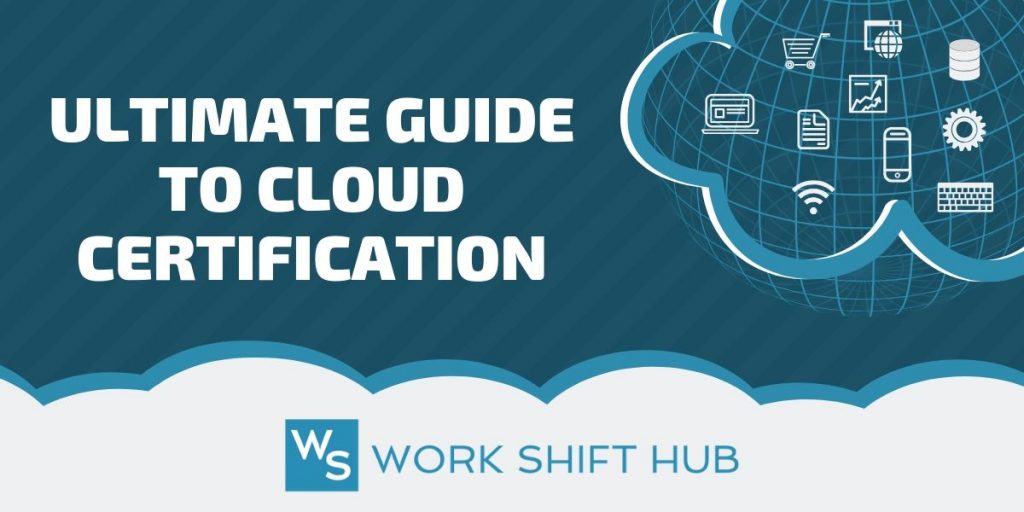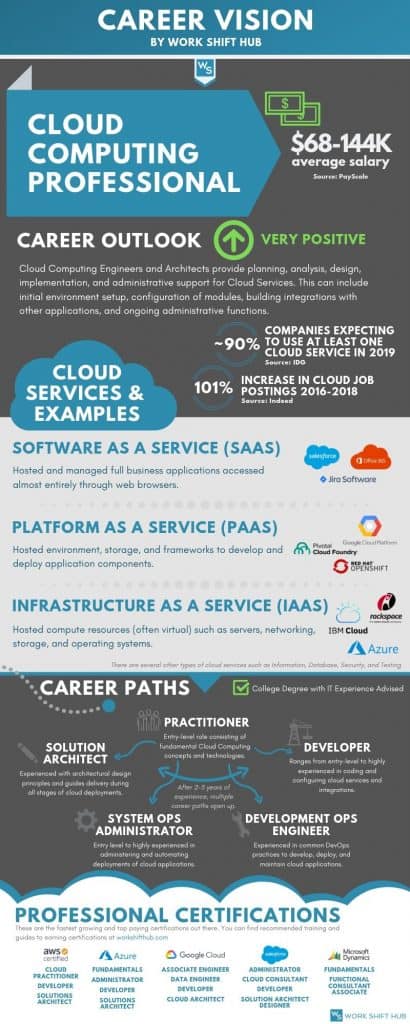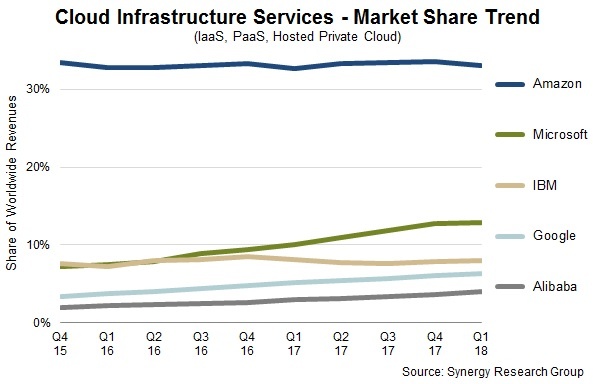

The rate of change in technology continues to exponentially increase. This means the skills to develop as IT professionals continue to shift as new technologies come onto the scene. One big trend that isn’t going anywhere is the migration of business applications to the cloud.
Earning a cloud certification focused on the “as a Service” domains of Infrastructure (IaaS), Platform (PaaS), or Software (Saas) will put you at the forefront of this trend. This is why Cloud Engineers are one of our top IT professions to get certified in this year. Without a doubt, your career will thank you later.

Cloud Adoption Growth
- 73% of companies had at least one application of cloud computing in 2018 with another 17% expecting to do so by 2019. (Source: IDG Cloud Computing Study)
- 30% of IT’s total budget will be allocated to cloud computing applications within the next year. This represents a shift from companies exploring and piloting cloud applications to purposeful investment in supporting more business through hosted applications. (Source: IDG Cloud Computing Study)
- The rate of growth in Software as a Service (SaaS), Platform as a Service (PaaS), and especially Infrastructure as a Service (IaaS) is incredible. According to a Gartner report on the Cloud market, the growth is only going to continue for these three services:
- IaaS expected to reach $63.0 billion by 2021 which is more than double the $31 billion it was in 2018.
- SaaS expected to reach $113.1 billion by 2021 which is a solid 56% increase from the $72.2 billion in 2018.
- PaaS expected to reach $27.7 billion by 2021 which is an astounding 82% jump above the $15.2 billion in 2018.
Why are companies moving to the Cloud at such a fast pace?
Organizations are running more of their business on the cloud to keep up with the high rate of change in the markets they serve. They also want greater flexibility to enable capabilities and services that address their customer’s needs. Rather than investing in support staff and infrastructure to maintain legacy systems, why not put that money towards new functionality and products?
Today, many large companies are looking to break free of their past. They are itching to replace many of the antiquated systems developed over the past several decades. These older technologies often require large projects to enhance and are supported by high-cost resources due to the small skill-set pool.
Unless you work at a start-up, you’ve likely heard business users complain that it takes “too long” for IT to respond to their needs. Speed-to-market is another major selling point since it takes literally minutes to create a new development environment or sandbox to play around in.
Cloud-based applications support IT in adopting agile delivery methodologies through rapid cycles of design, build, and prototyping. This allows you to get the product in front of the user at a faster pace. The time it used to take to purchase and install infrastructure is now shifting to value-add development activities and collecting real-time feedback from the business.
What are the different types of cloud services?
| Cloud Type | Description | Common Examples |
| Infrastructure as a Services (IaaS) | Hosted compute resources (often virtual) such as servers, networking, storage, and operating systems. | Amazon Web Services (AWS), Rackspace, Microsoft Azure, Google Compute Engine, IBM Cloud |
| Platform as a Services (PaaS) | Hosted environment, storage, and frameworks to develop and deploy application components. | Microsoft Azure, Heroku, Force.com, Google App Engine, AWS Elastic Beanstalk, OpenShift, Pivotal Cloud Foundry |
| Software as a Service (SaaS) | Hosted and managed full business applications accessed almost entirely through web browsers. | Google Apps, Salesforce, Cisco WebEx, Microsoft Office 365, Jira |
There are also services related to database, information, testing, security, and others which are beyond the types of cloud offerings identified above.
As you can see, there is a wide range of cloud services in the market for businesses to choose between. This means it’s also a challenge for IT professionals like you to determine which cloud certification will be most beneficial in the long run.
If you plan to stay with your current employer for a while, we’d recommend exploring what cloud solutions the company uses. It would also be smart for you to connect with the appropriate IT leaders to understand the company’s cloud strategy and roadmap.
Gaining insight into where the company is investing in cloud technology gives you a major advantage. It can help guide which cloud certifications you should pursue.
Who are the top cloud service providers?
The majority of websites and cloud-based applications are hosted by names we all know. This includes Amazon, Google, and Microsoft. There are many others that are not as well known for their cloud offerings. However, the landscape is changing quickly as many new players and older companies get into the mix.
Companies like IBM have historically been known for their legacy mainframe business. They quickly understood the need to change as competitors began rolling out products in the cloud. This meant those legacy technologies would eventually be replaced by these cloud-hosted solutions. This drove IBM to shift the company’s technology direction and led them into the cloud.
So, what does this rush to develop cloud technologies mean for you? Right now is the best time to build cloud computing skills and establish a future-proof resume. Companies of all sizes are looking for IT professionals that are able to architect, design, develop, test, deploy, or support applications on the cloud. There are just not enough candidates to fill these emerging cloud developer and architect roles.
With that context, let’s address two big questions you may have about a career in the cloud:
- Who are the top service providers across the three main cloud types (IaaS, PaaS, and SaaS)?
- Which cloud certifications should I pursue to build a career around these cloud technologies?
Top Infrastructure-as-a-Service (IaaS) Providers & Cloud Certifications
1. Amazon Web Services (AWS)
- Market Share: ~33%
- Trending: Holding Steady
- Highlights: Amazon AWS has a commanding lead in the IaaS space. An overwhelming percentage of companies have at least some aspect of their business running on AWS. Many smaller companies also use them to run their websites or e-commerce functions. There is no shortage of jobs if you want to pursue an AWS certification for developers or architects.
- Average Salary for AWS Certified Professionals (Source: PayScale)
- AWS Certified Developer: $96K
- AWS Certified Solution Architect: $107K
- Recommended AWS Training
- Top AWS Certifications
- AWS Cloud Certification Exam Cost
- Cloud Practitioner Exam: $100
- Associate Level Exam: $150
- Professional Level and Specialty Exams: $300
2. Microsoft Azure
- Market Share: ~13%
- Trending: Rapidly Rising
- Highlights: Microsoft has transformed its entire business the past few years under the leadership of Satya Nadella. Microsoft Azure has also picked up another 3% in market share and is growing faster than any competitor. A lot of this growth is due to an aggressive sales strategy and ability to compete on cost. Even if you have AWS certification, it would benefit you to also build expertise in the Azure platform. These two products account for the majority of IaaS cloud certifications and jobs.
- Average Salary for Azure Certified Professionals
- (Source: PayScale)
- Azure Certified Engineer: $89K
- Azure Cloud Solution Architect: $127K
- Recommended Microsoft Azure Training
- Top Microsoft Azure Certifications
- Azure Cloud Certification Exam Cost
- Microsoft Certification Exams: $150
3. Google Compute Engine
- Market Share: ~6%
- Trending: Rapidly Rising
- Highlights: Google Compute Engine provides virtual machines (VM) with best-in-class capabilities and the ability to deploy code directly in the environment or using containers. Google Cloud (Compute Engine) has grown rapidly in adoption over the past several years. This is primarily the case for individual / independent projects and smaller organizations. However, enterprise adoption has increased as companies evaluate alternatives to AWS and Azure for cloud computing.
- Average Salary for Google Cloud Certified Professionals
- (Source: PayScale)
- Google Cloud Certified Engineer: $94K
- Google Cloud Developer: $79K
- Recommended Google Cloud & Compute Engine Training:
- Top Google Compute Engine Certifications:
- Google Cloud Certification Exam Cost
- Associate Cloud Engineer Exam: $125
- Professional Cloud Architect & Data Engineer Exam: $200
- Professional Cloud Developer Exam: $200
- Professional Cloud Security & Network Engineer Exams: $120

Top Platform-as-a-Service (PaaS) Providers & Cloud Certifications
The Platform as a Service (PaaS) market has a few clear leaders widely used by most medium to large-sized companies. However, there is a large variety of platforms that provide development frameworks to address more specialized needs.
While we can’t cover them all, below are the top PaaS products and cloud certifications we recommend.
1. Red Hat OpenShift
- Trending: Rapidly Rising
- Highlights: OpenShift is Red Hat’s open source PaaS platform. It offers developers an integrated development environment (IDE) for building and deploying Docker containers. Due to its open-source framework, OpenShift has been widely adopted by small to medium-sized companies. However, it’s also being utilized by large organizations to rapidly develop and deploy applications.
- Average Red Hat Certified Engineer Salary: $97K (Source: PayScale)
- Recommended OpenShift Training:
- Top Red Hat OpenShift Certifications:
2. AWS Elastic Beanstalk
- Trending: Holding Steady
- Highlights: AWS Elastic Beanstalk supports applications coded in nearly all the major languages and frameworks; including Java, .NET, Node.js, PHP, Ruby, Python, Go, and Docker.
Its big selling point is its ability to take code almost as-is from the development machines to the cloud in little time and effort. Because deploying applications is so easy on AWS Elastic Beanstalk, it has become a favorite of many organizations that run their business on the AWS stack. - Average AWS Certified Developer Salary: $96K (Source: PayScale)
- Recommended AWS Elastic Beanstalk Training:
- Top AWS Elastic Beanstalk Certifications:
3. Heroku
- Trending: Rising Rapidly
- Highlights: Heroku is a cloud platform owned by Salesforce that uses a managed container system and integrated services to deploy and run applications. Heroku supports most of the most popular developer tools and frameworks; including Ruby, Java, PHP, Python, Node, Go, Scala and Clojure. They also have integrated development for Salesforce coding and many 3rd party services to extend the platform. Most companies that use Salesforces for enabling their Sales, Marketing, or Service business likely also deploy code on the Heroku platform.
- Average Heroku Engineer Salary: $78K (Source: Glassdoor)
- Recommended Heroku Training:
- Top Heroku Certifications:
- There are no official Heroku certifications. However, it is often covered as a component in “full-stack” developer certifications or nanodegrees like the one from Google on Udacity.
- If you are focused on information security, you should consider earning ISO 27001, ISO 27017, and ISO 27018 certification. These demonstrate your ability to implement security controls and measures to protect data stored and processed on Heroku and other cloud development platforms.
Top Software-as-a-Service (SaaS) Cloud Providers & Cloud Certifications
1. Salesforce CRM
- Trending: Rapidly Rising
- Highlights: Salesforce is considered the king of SaaS and this is apparent in the large job market for certified Salesforce admins, developers, and solution architects. Salesforce’s primary cloud products are Sales, Marketing, and Service Clouds. They are the top-rated cloud-based business software on the market. Salesforce was the first major software as a service (SaaS) product available and has since grown into an incredibly flexible platform. The underlying technology is based on metadata-driven configuration rather than code which makes administration extremely simple. This provides customers with unparalleled flexibility to meet their business needs while allowing for Salesforce’s three major upgrades per year. It also means a Salesforce certification and career is within reach for you, regardless of your technical skill level and background.
- Average Salary for Salesforce Certified Professionals (Source: PayScale)
- Salesforce Certified Administrator: $73K
- Salesforce Certified Developer: $81K
- Salesforce Certified Technical Architect: $135K
- Recommended Salesforce Training:
- Top Salesforce Certifications:
- Certified Salesforce Administrator (ADM 201)
- Certified Salesforce Advanced Administrator (ADM 301)
- Certified Salesforce Developer (DEV 401)
2. Microsoft Dynamics CRM
- Trending: Rising Rapidly
- Highlights: Microsoft Dynamics was once only an on-premise software product. As Microsoft saw the shift to the cloud coming, they knew there was no way they would keep up with the likes of Salesforce. Today, Dynamics CRM is hosted on Microsoft’s Azure platform and has
comparable technical capabilities to Salesforce. These two cloud heavyweights often go toe-to-toe when customers evaluate CRM products and Microsoft holds its ground with Salesforce in most cases. The adoption of Microsoft Dynamics has grown dramatically in recent years due to their willingness to compete on cost. They have a brand that is recognized worldwide and having a certification in Microsoft Dynamics will greatly boost your career opportunities. - Average Salary for Microsoft Certified Professionals (Source: Glassdoor)
- Dynamics Certified Developer: $64K
- Recommended Microsoft Dynamics Training:
- Top Microsoft Dynamics Certifications:
3. Atlassian JIRA
- Trending: Holding Steady
- Highlights: JIRA is the most widely used software development platform for IT organizations that follow an agile development methodology such as SCRUM. The platform offers agile teams the ability to create user stories, plan development sprints, log issues, and assign tasks to sprint team resources. JIRA provides the ability to effectively plan for product releases and track status through reports. If you are planning on a career in agile development, JIRA is the top-recommended development software to learn.
- Average Salary for Professionals with JIRA Experience (Source: PayScale)
- Certified Scrum Master: $87K
- Certified Software Engineer: $78K
- Recommended JIRA Training:
- Top JIRA Certifications:
Steps to build a career in Cloud Computing
Based on the information above, it’s clear cloud computing isn’t going anywhere for a long time. As covered by InformationWeek, the demand for cloud computing skills is only growing due to the constant increase in enterprises running their business in the cloud.
So, what are some of the steps you need to build a career in cloud computing?
- Define the type of technologies you enjoy and what part of the stack you have experience working with. (software, infrastructure, data, etc.)
- Research available cloud positions and career paths inside and outside your current employer. Explore your options, especially if the company you work at has not adopted cloud technologies.
- Take the technology for a test drive. Most cloud vendors offer a trial or free version of their product you can tinker around with.
- Obtain training and earn a cloud certification based on the cloud career path you select.
- Apply for cloud-oriented jobs that interest you and are relevant to your newly earned certification.
Conclusion
There is an incredibly large number of jobs being created for cloud certified IT professionals. This is a direct result of companies running more of their business on cloud applications. The range of roles and certifications for cloud professionals continues to grow every year.
There are roles for administrators, developers, architects, and engineers across nearly every IaaS, PaaS, and SaaS cloud product. We recommend you take some time to pick one of the cloud technologies and certifications above, then go after it at full speed. Cloud computing is only going to grow and your career will take off with the right certification.
Do you have any experience to share regarding the above certifications? Are there other IaaS, PaaS, or SaaS certifications you are considering? We would like to hear from you so please leave a comment below!





